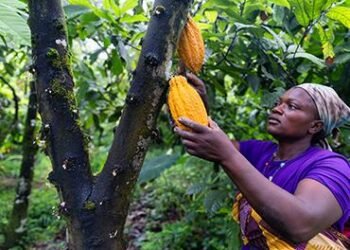The Deputy Minister of Food and Agriculture Designate, John Setor Domelo, has addressed critical challenges facing the agricultural sector in Ghana.
Answering questions during his parliamentary vetting, Domelo provided firsthand insights into the realities of agricultural practice and shared the hurdles he has encountered as a practitioner in the sector.
When asked to outline the three most pressing challenges in agriculture, Domelo was candid in his response. He identified access to credit as the most significant impediment, explaining that obtaining the necessary funding to expand farming operations remains a major struggle. “The first challenge is access to credit; for me to be able to expand, I need financial assistance,” he stated.
Domelo also highlighted Ghana’s land tenure system as another major constraint. He elaborated on the difficulties associated with securing land, narrating instances where landowners reclaim their property after realizing the success of agricultural investments.
“Sometimes you go to certain places, you negotiate for the land, and they give you the go-ahead. After a year or two, when they realize that everything is going well, they tell you that they want their land back. This problem is not just peculiar to me but to other farmers as well.”
John Setor Domelo, Deputy Minister of Food and Agriculture Designate
Additionally, he pointed out the scarcity of machinery as a crucial challenge that hampers productivity. Domelo lamented the long waiting periods before securing tractors for ploughing, which often leads to missing the optimal planting window.
“The rainy season is just about to start. Sometimes, before you book a tractor, it can take months before it arrives, and by then, the rainy season is over. This is a significant setback for farmers.”
John Setor Domelo, Deputy Minister of Food and Agriculture Designate
When questioned about the possibility of resolving credit access issues through initiatives like the Women’s Development Bank proposed by the ruling NDC, Domelo expressed optimism.
“Yes, Mister Chairman. Thank you very much,” he responded, affirming his belief that improved access to credit could be a game-changer for the agricultural sector.
Another critical concern raised during the vetting was the recent World Bank report warning of impending food insecurity in West and Central African nations, including Ghana. With food inflation already a pressing issue, Domelo was asked how the government planned to address the looming crisis.
He referenced the Ministry of Food and Agriculture’s recent launch of the “Irrigation for Wealth Creation” initiative, which aims to irrigate over 10,000 hectares of land.
“Once we’re able to irrigate over 10,000 hectares, there’s going to be more food production all year round. Even though the World Bank has warned of potential food shortages in the coming years, we are hopeful that by increasing the acreage to 25,000 or even 30,000 hectares, we can avert such a problem.”
John Setor Domelo, Deputy Minister of Food and Agriculture Designate
However, a follow-up question sought clarification on the feasibility of such large-scale irrigation, particularly in the short term. Domelo acknowledged the complexity of irrigation projects, citing factors such as land type, water sources, and soil conditions.
“Yes, there has been some form of calculation. Our primary focus right now is to ensure that we get water onto the land to feed our crops. It might be costly, but when compared to the consequences of food shortages, it is definitely worth the investment.”
John Setor Domelo, Deputy Minister of Food and Agriculture Designate

Ghana’s High Food Import Curse
Another pressing issue addressed during the vetting was Ghana’s heavy reliance on food imports and its impact on food inflation.
Domelo was asked how the Ministry of Food and Agriculture planned to reduce the influx of imported food items into the country and curb inflation.
He used the example of tomatoes, a staple food item heavily imported from neighboring countries, particularly during the dry season.
“What we’ve realized is that during the dry season, we import more tomatoes than usual. With the implementation of the irrigation scheme, we will be able to farm all year round and reduce these imports.”
John Setor Domelo, Deputy Minister of Food and Agriculture Designate
Beyond irrigation, Domelo emphasized the government’s broader strategy to promote local consumption of Ghanaian-grown food.
“The project is aimed at encouraging Ghanaians to eat what we grow in Ghana and make it affordable. Hopefully, this will help decrease the food import bill and ensure food security in the long run.”
John Setor Domelo, Deputy Minister of Food and Agriculture Designate
The vetting session provided a platform for Domelo to outline his vision and strategies for addressing Ghana’s agricultural challenges.
His responses underscored the government’s commitment to tackling issues such as credit access, land tenure, machinery shortages, irrigation, and food imports.





















